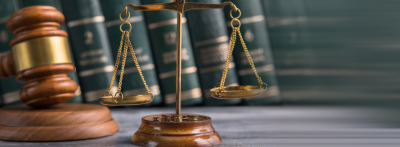Those working in criminal justice, from police officers to forensic analysts, have an important duty to let ethics guide every decision they make on the job. If you're considering a career in criminal justice, understanding your ethical obligations and how to uphold them in your work can help the system work more fairly for everybody while mitigating corruption.
So, what do you need to know about ethics in criminal justice as somebody with aspirations to make a positive difference in the lives of others?
What Are Ethics in Criminal Justice?
According to the American Psychological Association (APA), ethics in criminal justice refers to "the principles of morally right conduct established by a person or a group or considered appropriate to a specific field."
In criminal justice specifically, ethics encompass the professional standards and rules that workers are expected to follow to maintain integrity and accountability.
Why Ethics Matter in Criminal Justice Careers
Ethics are important across all industries, but they are essential in the field of criminal justice for several reasons. Let’s dive into exactly why ethics matter so much in this field:
Building Public Trust and Legitimacy
For starters, ethical behavior among criminal justice professionals can help build trust and confidence with members of the public. When the public trusts members of the criminal justice system to do the ethical thing, there may be greater cooperation, and the system is more effective as a whole.
Navigating Complex Moral Dilemmas
Members of the criminal justice system often face complex moral dilemmas in their everyday work, including situations that no amount of formal training can prepare them for. With a solid ethical foundation in place, however, these professionals can make the right decisions to avoid conflicts of interest and other professional issues.
Upholding Constitutional Rights
Under the Constitution of the United States, all citizens are entitled to fundamental human rights, including a fair legal system. When criminal justice professionals act ethically in their work, they are doing their part to ensure that every citizen's constitutional rights are being upheld, including the right to equal protection and due process.
Preventing Misconduct and Legal Liability
When criminal justice professionals act with ethics at the forefront, they can also be proactive about avoiding potential allegations of misconduct, abuse of power, or other legal liability. In other words, ethical behavior can help ensure that power is used responsibly and fairly among professionals in the field.
Common Ethical Issues in Criminal Justice
Unfortunately, you don't have to search for very long to find examples of criminal justice professionals who have made mistakes in judgment, letting ethics fall by the wayside. From issues surrounding the use of force to full-blown corruption, numerous common ethical issues pervade the field.
Use of Force
Allegations of excessive force or unnecessary force carried out by law enforcement officers run rampant. When these events continue to occur, a sense of mistrust and divide can form between law enforcement and the general public.
Racial and Cultural Bias
Within the field of criminal justice, there have also been some ongoing ethical concerns surrounding the existence of racial and cultural bias. Unfortunately, racial profiling and other biases can lead to unfair treatment of members of the public by law enforcement officers, legal staff, and others in the field.
Confidentiality and Privacy
In the legal field, especially, concerns surrounding confidentiality and privacy are also a very real issue. When clients feel their personal information isn't being properly protected, this can erode trust between them and their legal counsel.
Corruption and Bribery
Another ethical issue that can undermine the integrity of the criminal justice system is that of corruption. This occurs when criminal justice professionals (such as law enforcement officers or corrections officers) use bribery or other abuse of power to their personal benefit.
Truthfulness in Testimony and Reporting
Criminal justice professionals are often called upon to testify under oath, with the promise that the testimony they provide is accurate to the best of their knowledge. Unfortunately, this isn't always the case, and questions surrounding deception and lies in both testimony and reporting continue to affect the public's perception of the field.
How Criminal Justice Degree Programs Teach Ethics
While no two criminal justice degree programs are exactly alike, these programs typically include coursework on ethical principles and standards relevant to the industry. Some programs may even have dedicated ethics courses that all criminal justice students are required to complete, allowing students to improve their own integrity and accountability before they even enter the field.
Career Paths Where Ethics Is Critical
Ethical behavior is essential throughout the entire criminal justice field, but it is especially crucial in certain specific career paths.
Law Enforcement Officers
Law enforcement officers, including police officers, have the power to arrest people and strip them of some of their rights. As a result, they must act with ethical considerations at the forefront of everything they do to ensure fairness and protect individual rights.
Probation and Parole Officers
Probation and parole officers also have the power to send people back to jail or prison, which is why ethical behavior and decision-making are so crucial in ensuring that the criminal justice system works as intended. When conflicts of interest arise between these officers and criminals, this can result in mistreatment or even misconduct that chips away at public trust.
Correctional Officers
Correctional officers are responsible for maintaining order in jails and prisons while ensuring that people in custody remain safe and are treated with humanity. Acting ethically as a corrections officer is critical to maintaining a sense of order in these facilities while promoting trust and fair treatment of inmates.
Crime Scene Investigators and Forensic Analysts
Meanwhile, crime scene investigators and forensic analysts have an essential duty to maintain the integrity of evidence while remaining objective and non-biased in their work. When these professionals act with ethics and moral principles in mind, they can support the efforts of the criminal justice system as a whole.
Court Clerks and Legal Support Staff
Finally, those in the legal side of the field (including court clerks and support staff) must maintain a sense of ethical behavior in their work. This is particularly evident when it comes to maintaining the confidentiality and privacy of clients' personal information and avoiding any potential conflicts of interest.
Benefits of Ethical Training for Criminal Justice Professionals
When criminal justice professionals (and those aspiring) receive dedicated ethical training, they can reap numerous benefits not just for themselves, but for the communities they serve as well.
Career Advancement
Ethical professionals are more likely to build a sense of trust between themselves and their peers, which could lead to consideration for promotions and other career advancement opportunities that require sound ethical decision-making.
Professional Reputation
When criminal justice professionals repeatedly make ethical choices on and off the job, they gradually build their professional reputations over time. Having a solid reputation as somebody who acts ethically and with impartiality is especially important in a field like criminal justice, where public trust hinges on perception.
Improved Decision-Making
With ethical standards guiding their everyday choices and behavior, criminal justice professionals can make more confident and informed decisions, regardless of whether they're working in law enforcement, legal support, or even the forensic side of the field.
Community Impact
Last but not least, criminal justice professionals who continuously exercise ethical behaviors can gradually build a greater sense of trust between their agencies and members of the community. This, in turn, can help the criminal justice system work better for everybody.
How Champlain College Online Prepares You for Ethical Leadership
At Champlain College Online, we believe that ethics should be at the forefront of every decision criminal justice professionals make. That's why at Champlain College Online (CCO), we offer such dedicated coursework as PHIL 240 (Ethics in Civic & Professional Life). In this course, students learn about the standards of right and wrong in the field, especially in terms of how these standards relate to their future work.
Ready to Lead with Integrity?
When criminal justice professionals adhere to strict ethical standards in their work, the entire system can work the way it was intended. Whether you're considering a career in law enforcement, legal counsel, or forensics, knowing how to uphold those ethics in criminal justice in your work will be one of the most important responsibilities you carry out.
Looking for a degree program to help you prepare for a rewarding career in the criminal justice system? Champlain College Online's bachelor's in criminal justice program covers coursework in such critical topics as criminal law and criminology, juvenile justice, ethics in civic and professional life, and more. Get in touch to request information about this online program or get the ball rolling on your application today.
Download Program Guide
Learn what you can expect from our online bachelor's in criminal justice program.

Download Program Guide
I acknowledge that, by clicking the "submit" button, I am giving my express written consent to Champlain College and its representatives to contact me about educational opportunities via email, text, or phone, at the phone number above, including my mobile phone, using an automatic dialer, or pre-recorded message. Message and data rates may apply. I understand that my consent is not a requirement for enrollment, and I may withdraw my consent at any time.






